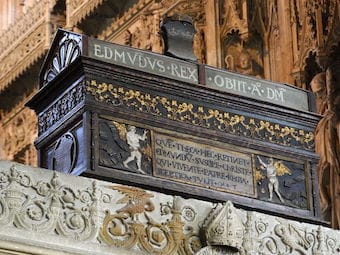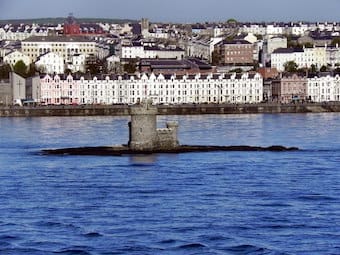A reconstruction of a helmet found at the Sutton Hoo burial site, dating back to the sixth and seventh centuries. Edmund was about thirty-four in 1015 when he rebelled against his father Ethelred, and after a reconciliation inherited Ethelred’s crown a year later. At once he was plunged into whirl of battles and betrayals, and earned the soubriquet ‘Ironside’ for his fighting spirit and resilience. As Henry of Huntingdon indicated, so doughty a warrior was the King that, but for the scheming of the double agent Edric, he might well have seen Cnut off and the whole course of English history might have been quite different.
CNUT also, and Edric, laid their plans for obtaining by treachery the success which they could not gain by arms, and Edric undertook to betray King Edmund. In consequence, by his advice, the king went into Wessex* to lead a very powerful army against Cnut, who, meanwhile, had laid siege to London, which he furiously assaulted both by land and water, but the citizens defended it manfully.
The fifth time, King Edmund, again fording the river Thames at Brentford, went into Kent to give battle to the Danes, but at the first encounter of the standard-bearers in the van of the armies, a terrible panic seized the Danes, and they took to flight. Edmund followed them with great slaughter as far as Aylesford,* and if he had continued the pursuit, the Danish war would have been ended that day. But the traitorous counsel of the ealdorman Edric induced him to halt. Never had more fatal counsel been given in England.*
* Wessex was an ancient English kingdom that, since its heyday under King Egbert (r. 802-839), had reached right across England south of the Thames, from Kent to Cornwall. Following Edmund’s death in 1016, King Cnut granted the region to his ally Godwin, whom he created Earl of Wessex.
* Aylesford is a village on the River Medway in Kent, four miles northwest of Maidstone.
* See also If England to Itself Do Rest but True, where in the closing lines of William Shakespeare’s King John, Henry III’s cousin Philip Faulconbridge reflects that a kingdom’s greatest threat always lies in treachery at home.
Questions for Critics
1. What is the author aiming to achieve in writing this?
2. Note any words, devices or turns of phrase that strike you. How do they help the author communicate his ideas more effectively?
3. What impression does this passage make on you? How might you put that impression into words?
Based on The English Critic (1939) by NL Clay, drawing on The New Criticism: A Lecture Delivered at Columbia University, March 9, 1910, by J. E. Spingarn, Professor of Comparative Literature in Columbia University, USA.
Précis
One of Edmund’s most trusted counsellors, Edric, encouraged him to go on a wild goose chase so that Cnut, with whom Edric was conspiring, could besiege London once again. Edmund hurried back and drove the Danes off, but once again the perfidious Edric intervened disastrously, holding him back from pursuing his advantage. (52 / 60 words)
One of Edmund’s most trusted counsellors, Edric, encouraged him to go on a wild goose chase so that Cnut, with whom Edric was conspiring, could besiege London once again. Edmund hurried back and drove the Danes off, but once again the perfidious Edric intervened disastrously, holding him back from pursuing his advantage.
Variations: 1.increase the length of this precis to exactly 55 words. 2.reduce the length of this precis to exactly 45 words. 3.introduce one of the following words into the precis: besides, just, must, not, otherwise, whereas, whether, who.
Archive
Word Games
Spinners Find in Think and Speak
For each group of words, compose a sentence that uses all three. You can use any form of the word: for example, cat → cats, go → went, or quick → quickly, though neigh → neighbour is stretching it a bit.
This exercise uses words found in the accompanying passage.
1 Drive. Numb. Victory.
2 Far. Fourth. Retreat.
3 Force. Give. Soldier.
Variations: 1. include direct and indirect speech 2. include one or more of these words: although, because, despite, either/or, if, unless, until, when, whether, which, who 3. use negatives (not, isn’t, neither/nor, never, nobody etc.)
Adjectives Find in Think and Speak
For each word below, compose sentences to show that it may be used as an adjective. Adjectives provide extra information about a noun, e.g. a black cat, a round table, the early bird etc..
This exercise uses words found in the accompanying passage.
1 Great. 2 Severe. 3 Successful. 4 Ancient. 5 Powerless. 6 Endless. 7 Cross. 8 Far. 9 Same.
Variations: 1.show whether your adjective can also be used as e.g. a noun, verb or adverb. 2.show whether your adjective can be used in comparisons (e.g. good/better/best). 3.show whether your adjective can be used in attributive position (e.g. a dangerous corner) and also in predicate position (this corner is dangerous).
Opposites Find in Think and Speak
Suggest words or phrases that seem opposite in meaning to each of the words below. We have suggested some possible answers; see if you can find any others.
This exercise uses words found in the accompanying passage.
Variations: 1.instead of opposites, suggest words of similar meaning (synonyms). 2.use a word and its opposite in the same sentence. 3.suggest any 5 opposites formed by adding in-.
High Tiles Find in Think and Speak
Make words (three letters or more) from the seven letters showing below, using any letter once only. Each letter carries a score. What is the highest-scoring word you can make?
Your Words ()
Post Box : Ask Nicholas
Grok : Ask Grok
You are welcome to share your creativity with me, or ask for help with any of the exercises on Clay Lane. Write to me at this address:
See more at Post Box.
If you like what I’m doing here on Clay Lane, from time to time you could buy me a coffee.
Buy Me a Coffee is a crowdfunding website, used by over a million people. It is designed to help content creators like me make a living from their work. ‘Buy Me a Coffee’ prides itself on its security, and there is no need to register.
Related Posts
The invading Danes fought so fiercely that Edmund Ironside, the young English king, threw all caution to the wind.
Picture: By Matthew Paris (1200-1259), via Wikimedia Commons. Licence Public domain.. Source.
Posted January 4 2022
Edmund Ironside, King of England, and Cnut the Great, King of Denmark, fought hand-to-hand for one of European history’s richest purses.
Picture: © Jakub T. Jankiewicz, Wikimedia Commons. Licence: CC BY-SA 4.0.. Source.
Posted January 3 2022
Edric’s treason handed the crown of England to Cnut the Great, but Cnut was not so poor a judge of character as to believe that a traitor could be trusted.
Picture: © Akoliasnikoff, Wikimedia Commons. Licence: CC BY-SA 3.0.. Source.
Posted January 2 2022






